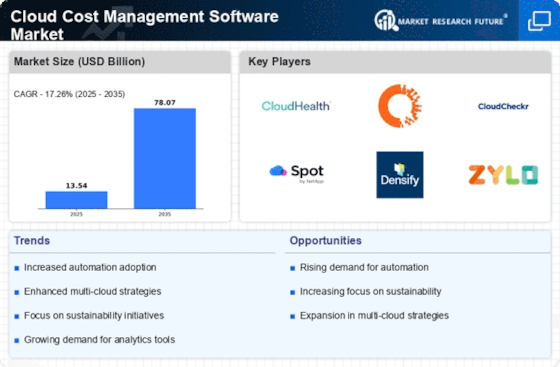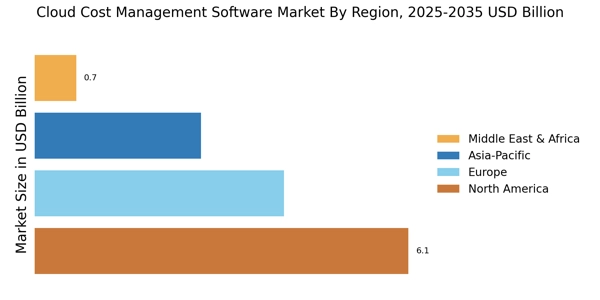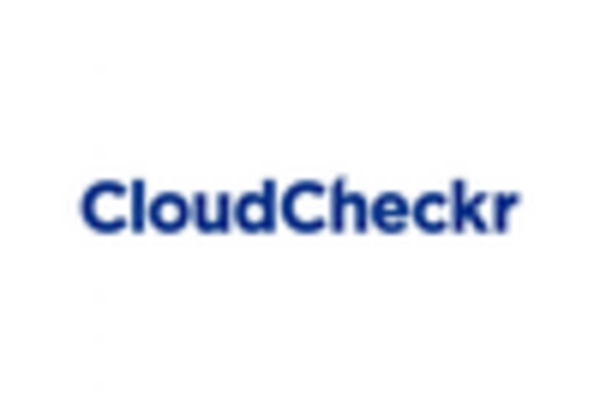Rising Cloud Adoption
The increasing adoption of cloud computing across various sectors is a primary driver for the Cloud Cost Management Software Market. Organizations are migrating to cloud environments to enhance operational efficiency and scalability. According to recent data, the cloud services market is projected to reach a valuation of over 800 billion dollars by 2025. This surge in cloud adoption necessitates effective cost management solutions to monitor and optimize expenditures. As businesses expand their cloud usage, the demand for specialized software that can provide insights into spending patterns and resource utilization is likely to grow. Consequently, this trend is expected to propel the Cloud Cost Management Software Market, as companies seek to mitigate overspending and maximize their return on investment.
Demand for Real-Time Analytics
The demand for real-time analytics is a crucial driver for the Cloud Cost Management Software Market. Organizations are increasingly seeking immediate insights into their cloud spending to make informed decisions. Real-time analytics enables businesses to monitor usage patterns, identify anomalies, and adjust their strategies promptly. This capability is particularly important in dynamic cloud environments where costs can fluctuate rapidly. The market for cloud cost management solutions that offer real-time data visualization and reporting is projected to expand significantly. Companies recognize that timely access to financial data can lead to better resource allocation and cost savings. Therefore, the emphasis on real-time analytics is likely to propel the Cloud Cost Management Software Market, as organizations strive for agility and responsiveness in their cloud financial management.
Regulatory Compliance Requirements
The evolving landscape of regulatory compliance is another significant driver for the Cloud Cost Management Software Market. Organizations are increasingly required to adhere to various regulations concerning data security and financial reporting. Compliance mandates often necessitate detailed tracking and reporting of cloud expenditures, which can be complex without the right tools. As a result, businesses are turning to cloud cost management solutions to ensure they meet these regulatory requirements while maintaining transparency in their financial operations. The demand for compliance-focused software is expected to rise, as organizations seek to avoid penalties and enhance their operational integrity. This trend is likely to bolster the Cloud Cost Management Software Market, as companies prioritize compliance in their cloud strategies.
Emergence of Multi-Cloud Strategies
The adoption of multi-cloud strategies is reshaping the Cloud Cost Management Software Market. Organizations are increasingly utilizing multiple cloud service providers to leverage the best features and pricing options available. However, managing costs across various platforms can be challenging, leading to a growing need for comprehensive cost management solutions. The multi-cloud approach allows businesses to avoid vendor lock-in and optimize their cloud spending, but it also complicates financial oversight. As a result, cloud cost management software that can integrate data from multiple sources is becoming essential. This trend is expected to drive innovation and growth within the Cloud Cost Management Software Market, as companies seek to streamline their multi-cloud environments and enhance cost efficiency.
Increased Focus on Cost Optimization
As organizations strive to enhance profitability, there is a heightened focus on cost optimization, which significantly influences the Cloud Cost Management Software Market. Companies are increasingly aware of the financial implications of cloud services, leading to a demand for tools that can provide detailed analytics and reporting on cloud expenditures. The market for cloud cost management solutions is anticipated to grow at a compound annual growth rate of approximately 25% over the next few years. This growth is driven by the need for businesses to identify wasteful spending and implement strategies to optimize their cloud resources. By leveraging cloud cost management software, organizations can achieve better financial control, thereby fostering a more sustainable approach to cloud usage.
.png)

















